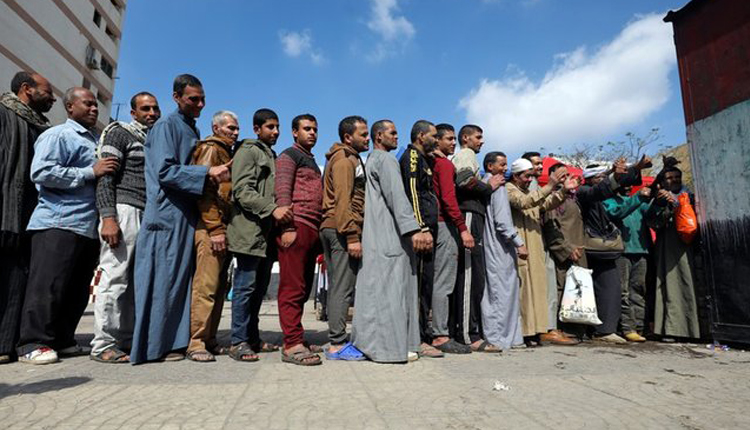Polling stations across Egypt opened their doors on Saturday for the first of three days of voting in a referendum on a series of constitutional amendments.
There are currently 10,878 central polling stations and 13,919 polling stations across the country available for the vote, which closes on Monday night.
More than 61 million Egyptians are eligible to vote in the referendum.
President Abdel Fattah al-Sisi cast his vote at Martyr Mostafa Yousry Emira school in Heliopolis.
National Elections Authority spokesman Judge Mahmoud El-Sharif said on Saturday afternoon that the authority had sent more judges and administrative assistants to several polling stations due to the “huge” turnout.
The authority sent more judges and administrative assistants to several polling stations in Cairo, South Sinai and Suez, El-Sharif told Sada El-Balad TV station.
According to state-owned agency MENA news agency, mass rallies were held in support of the proposed constitutional amendments in Cairo, Menoufia, Kafr El-Sheikh, Gharbia, North Sinai and Aswan governorates.
Egypt’s parliamentary speaker Ali Abdel-Aal told reporters on Saturday that all the suggestions and opinions on the new constitutional amendments, whether for or against, were heard for 30 days.
Abdel-Aal added that the turnout at the polling stations reflected how keen citizens were to practice their political rights, as well as their belief in the recent political and economic reform achievements.
Around 20,000 judges will supervise the voting process at ballot boxes, and 55 local civil society groups, five foreign non-government organisations and three national councils will monitor the vote, the head of the authority Judge Lasheen Ibrahim told Al-Ahram daily previously.
Egyptians who live in governorates outside of their local election constituencies can vote at special polling station reserved for out-of-governorate voters, according to the National Elections Authority.
Voters abroad began voting at 140 Egyptian consulate and embassy in 124 countries on Friday; polls abroad will close on Sunday evening..
Egyptians are voting on the proposed amendments to the 2014 charter, which were overwhelmingly approved by the parliament on Tuesday ,with 531 out of 596 members in favour, 22 against and one abstention.
On the presidency, the amendments include changing the length of presidential terms to six instead of four years.
They also extend the second term of President Abdel Fattah al-Sisi, which is set to end in 2022, by two years, and allow him to run for the office for another term in 2024.
Sisi was first elected president in 2014 and was re-elected last year in a landslide victory wherein he secured 97 percent of the vote.
Vote counting in the referendum is scheduled to start at the end of the last voting day, on Monday.
The package of amendments will pass if they secure an absolute majority of valid votes, without requiring a quorum, per the constitution, Lasheen explained.
Those who back the changes say they are important for the stability of a country, and to allow the president more time to carry out his economic development plans. Critics say the changes will lead to increased presidential powers.
The Egyptian authorities had heightened security across the country ahead of the vote.
The interior ministry said it is adopting an extensive plan to “maintain security and order” and deal with any attempt to “disturb peace and security.”
Those who will abstain from voting will be subject to existing laws that criminalise voting abstention, Lasheen said.
On Thursday, Egypt’s Religious Endowments Minister Mohamed Mokhtar Gomaa called on Egyptians to go to the polls, saying participation is a “national duty.”
The election authority has issued a number of regulations governing media coverage of the vote, including forbidding journalists from asking voters which way they are voting on the package of amendments.
Lasheen said the regulations are not meant to impose restrictions but rather to guarantee “a regular and smooth process.”
A special committee has been tasked with identifying violations.
Egyptians who live in governorates outside of their local election constituencies can still vote at special polling station reserved for out-of-governorate voters, according to Lasheen.
The election authority has set up special polling stations in industrial zones, in the under-construction New Administrative Capital Egypt east of Cairo, and at sites of other national megaprojects, to allow construction workers to vote.
New polling stations have also been set at Cairo International Airport and at major railway stations to draw more voters, and arrangements made at stations to accomodate citizens with special needs.
Egyptians living abroad began voting at diplomatic missions around the world on Friday. They have until Sunday to cast their votes.
The amendments being voted on this weekend also give the president new powers to appoint members of the judiciary, and would create a second chamber of parliament, the Senate, with one-third of its members to be appointed by the president.
The amendments also assign the armed forces of the country the role of “safeguarding the constitution and democracy and the fundamental makeup of the country and its civil nature, the gains of the people and the rights and freedoms of individuals.”
They reintroduce the post of vice president, allowing the head of state to appoint one or more vice presidents, and allocate at least a quarter of the seats in parliament to women.The current constitution was approved in a 2014 referendum.
It was a correction to an Islamist-backed controversial charter drafted under then Islamist President Mohamed Morsi, nearly two years after his predecessor Hosni Mubarak was overthrown in a popular uprising.
More than 680,000 Egyptian expatriates were eligible to vote in the 2014 referendum.
Source: Ahram Online


